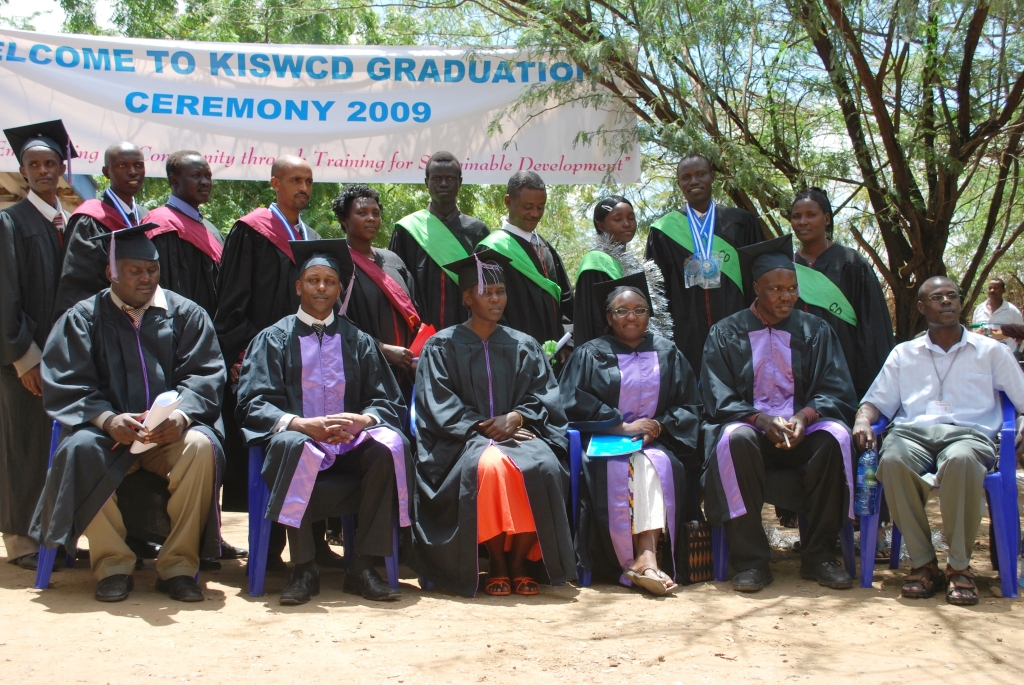Amid hardship, refugees demonstrate the ability to achieve their goals in higher education. A graduation ceremony recently honored distance-learning students of UNISA and KISWCD with both diploma and degree certificates.
 On the 24 of October, 2009, the Kenyan Institute of Social Work and Community Development (KISWCD), in conjunction with Jesuit Refugee Services (JRS), held its second graduation ceremony in Kakuma Refugee Camp. Several graduates received a degree in communications and sociology, while others received a diploma certificate in community health and community development.
On the 24 of October, 2009, the Kenyan Institute of Social Work and Community Development (KISWCD), in conjunction with Jesuit Refugee Services (JRS), held its second graduation ceremony in Kakuma Refugee Camp. Several graduates received a degree in communications and sociology, while others received a diploma certificate in community health and community development.
Humanitarian agency staff from KISWCD, JRS, Windle Trust Kenya (WTK), Film Aid International (FAI), and Don Bosco joined graduates and friends for the ceremony. The event kicked off at about 10:00 am with a word of prayer from the Father of Don Bosco. Welcoming speeches were followed by youth performing traditional songs and dances. All the cultural performances symbolized the importance of education for hope in life.
“Conditions are not favorable, but I can see there is also hope”
The event reached its climax as senior officials of the day were invited for their speeches. The WTK representative Mr. John Macheche welcomed the sponsorship initiative and expressed his support. “We are working closely with JRS in many programmes like World University Service of Canada (W.U.S.C), but the resources are limited and qualification is competitive. We are committed and we want to support education,” said Mr. Macheche.
The JRS Country Director Christine Mwaniki, who was the chief guest, was welcomed onto the stage with loud cheers from the audience. She had a remarkable speech and confirmed that JRS will continue to support sponsorship opportunities. “We are operating in Eastern Africa and our objective is to accompany, to serve and to advocate for your rights,” said Ms. Mwaniki.
According to Ms. Mwaniki’s speech, JRS Headquarters in Nairobi cater for urban refugees while other programs support refugees here in the camp. “We also offer psychosocial support and try to offer Canadian resettlement to people with physical disabilities, though these numbers are limited,” she said.
The KISWCD principal gave a powerful speech with a message that enriched the audience. The principal emphasized the hope of change for the ways of life and circumstances of refugees and migrants. “I have a good message to take back to Nairobi. The conditions are not favorable and there is pain, but I can also see there’s hope,” said Mr. Jackson Wachira in his speech.
The principal of KISWCD encouraged refugee youth to strive for academic success. He noted that the college continues to offer support for students through a more advanced system with the collaboration of Jomo Kenyatta University of Agriculture and Technology (JKUAT) and Daystar University.
Finally the KISWCD examination officer, Mr. Obala, was invited to present the awards. Graduates were joined by friends and family as the celebrations continued.
Graduates express joy and look to the future
Several graduates expressed joy and thanks to both the KISWCD and JRS for their support of learning opportunities even amid hardship.
KANERE spoke to A.D., a Kenyan Certificate of Secondary Education (KCSE) 2008 candidate who scored an A- grade. His high performance earned him a sponsorship and he is currently attending WUSC classes in the camp, preparing for his move to Canada. He stated that he was happy about his sponsorship and wishes to study in the field of construction and architecture in the future.
“It’s so great. This is now an acknowledgement of achievement that will encourage those who are coming behind me to have hope to do the same. I also made friends whom I could not [otherwise] have met and I got an award,” said A.D.
KISWCD continues to serve refugees’ educational needs
JRS sponsored the graduation ceremony, and offers several forms of assistance to refugees and immigrants in collaboration with WTK. After completion of WUSC classes in Kakuma, the graduating students were sent to Nairobi for the test of English as Foreign Language Examination (TOEFL).
KISWCD’s inception in 1997 marked the beginning of the college’s activities in the areas of creation, learning, and research towards community development and finding solutions to the daily problems faced by camp residents. In Kakuma Refugee Camp, studies take place in the compound of JRS/UNISA (the distance learning center of the University of South Africa), located in Zone Five of Kakuma One.
When a KANERE journalist approached Ms. Mwaniki for comments on the occasion, she declined. “We have a mass information officer who is to speak to journalists; our protocol demands that I cannot do that,” she explained.
